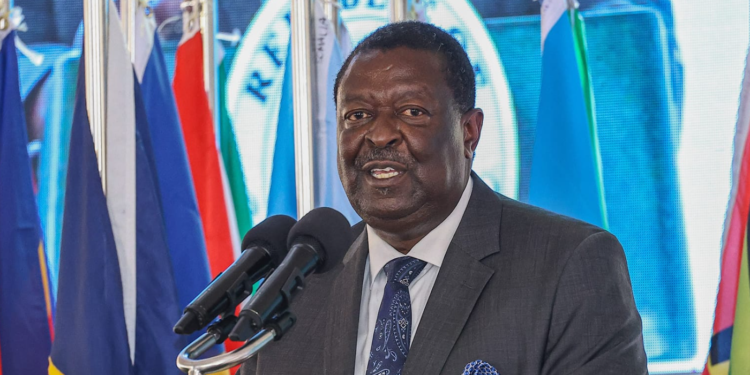Prime Cabinet Secretary Musalia Mudavadi on Wednesday acknowledged significant delays in processing national identity cards (IDs) for Kenyans living in the United States, citing technical challenges and understaffed consulates. Speaking during a Senate hearing, Mudavadi attributed the inefficiencies to the manual nature of the ID application process, outdated systems, and financial constraints within Kenya’s diplomatic missions in the US.
“The processing of ID cards is entirely manual, and verification of all applications must be done by the National Registration Bureau (NRB), which causes delays, especially in missions that are not well staffed,” Mudavadi told Senators. He noted that Kenyan missions in the US, particularly in New York and Los Angeles, are struggling to keep up with demand due to inadequate personnel and financial difficulties.
Mudavadi, who also serves as the Foreign and Diaspora Affairs Cabinet Secretary, explained that the manual ID processing system, combined with e-citizen platform glitches, had resulted in significant delays for Kenyans abroad, especially in regions with a large diaspora population. “The system sometimes rejects foreign numbers, where the one-time password [OTP] is sent to the wrong phone numbers. We are sensitizing the diaspora to use the email option,” he said, adding that the diaspora affairs office is working with local telcos on a potential e-SIM solution.
The Prime Cabinet Secretary admitted that despite efforts to improve services for Kenyans living abroad, a number of logistical and bureaucratic hurdles remain. He outlined the challenges faced by Kenya’s consulates, stating that some ID cards were ready for collection but had not been picked up due to incorrect return mailing addresses provided by applicants. For instance, Mudavadi revealed that eight ID cards were currently held at the Kenyan consulate in New York, awaiting further communication from their owners.
Mudavadi’s appearance before the Senate was largely focused on addressing complaints from the diaspora community about the slow pace of consular services and poor staffing levels at Kenyan missions. Senators, including Nairobi Senator Edwin Sifuna, expressed their dissatisfaction with the government’s handling of the issue. “I thought that the full title of the CS for Foreign Affairs also puts him in charge of coordination with other ministries. Surely, if there are issues beyond Foreign Affairs, we expect a more solid response,” Sifuna said, highlighting concerns about the insufficient number of staff at key consulates in the US.
Sifuna pointed out the disparity between the consulate in New York, which is manned by just one officer, and Los Angeles, which has seven. “What happens when the one person in New York falls sick? That is why there are so many problems in these consulates,” Sifuna asked. Mudavadi admitted that the disparity in staffing was an issue, but he explained that financial constraints had limited the government’s ability to adequately staff its missions abroad.
Mudavadi also conceded that the Ministry of Foreign and Diaspora Affairs, like many other government agencies, has faced severe budget cuts following the passage of the finance bill. “We have seriously had to do a haircut in the Ministry of Foreign Affairs, just like other ministries. As of now, let me admit that we are constrained financially, and it is a challenge facing the entire country,” he said.
Despite these challenges, the ministry has undertaken outreach efforts to decentralize ID processing services. Mudavadi said mobile consular services have been deployed in several US cities, including Seattle, Dallas, and Boston, where thousands of Kenyans have received their identification documents. “Through the rapid results initiative, we processed 2,459 identity cards in outstations,” he said, adding that more outreach missions are planned for the third quarter of the 2024/25 financial year.
The Prime Cabinet Secretary further reassured the Senate that the government was making efforts to automate the processing of IDs to eliminate manual delays. “Automation and technology are things we are pursuing within the context of the Ministry of Foreign Affairs, in liaison with immigration, to improve services,” he said.
















